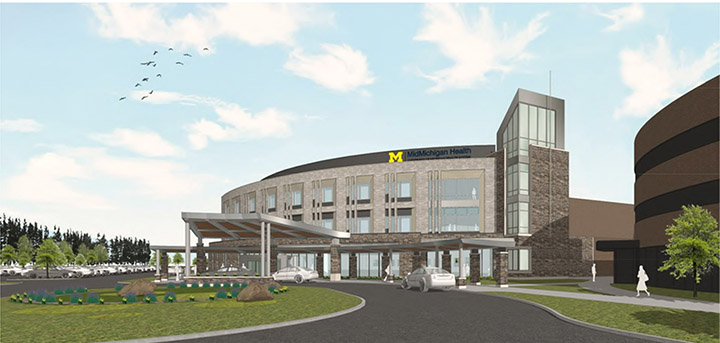ALPENA, MI | by Julie Goldberg | July 22, 2019
Original article can be found at: https://www.thealpenanews.com

Renovation, innovation to improve Northeast Michigan health care
ALPENA — Northeast Michigan providers are tasked with providing quality care in an environment in which physicians are few and the distance between a patient and medical care can be great.
Local medical professionals say they are combating those challenges with collaboration, technology, and new facilities.
Partnership with the community in efforts to provide a health-promoting environment allows local health care providers to extend their effectiveness beyond the walls of offices and patient rooms and out into residents’ daily lives, officials said.
“It’s a partnership between the medical provider and the patient,” Malinda Amlotte, community outreach and marketing manager at Alcona Health Center, said. “The patient is at the center, and we work with them to meet and achieve their health goals.”
COLLABORATIVE CARE
Dr. David Corteville, a cardiologist employed with McLaren Northern Michigan in Petoskey, sees patients once a week at McLaren’s satellite site in Rogers City, plus once a month in Hillman and Onaway.
In rural areas such as Northeast Michigan, Corteville said, such local specialty care opportunities are crucial, as patients are more likely to follow up on appointments and receive the care they need if the traveling distance is reduced.
A nationwide trend of integrated care in rural areas is helping to solve problems associated with too few physicians and too much distance between patients and specialists and emergency care.
Alcona Health Center and Thunder Bay Community Health Service, which serve residents at multiple outlying locations around the four-county area, have embraced the collaborative care philosophy, making health care a simple, one-stop experience by offering medical and behavioral health care, dental, and pharmacy services under one roof in what officials call a “patient- centered medical home.”
In addition, local health care providers said they must have a back-and-forth relationship that allows them to draw on each other’s strengths.
“One thing we do so well in northern Michigan is collaborate, because we have to,” Amy Hepburn, program development director for Thunder Bay Community Health Service, said. “We don’t work in silos. We come together and coordinate care and collaborate really well.”
‘WE HAVE TO EMBRACE IT’
Alpena, like many other rural areas, faces the challenge of physician acquisition and retention.
MidMichigan Medical Center-Alpena works with several downstate universities to bring medical students into the area on a rotating basis.
Some of those, hospital President Chuck Sherwin said, might come back. It’s happened before: In the past year, one of the medical students who worked a rotation with MidMichigan became attached to the area and now works full-time in Alpena.
In a survey conducted by MidMichigan in 2018, residents indicated a high level of comfort with telemedicine: care delivered via electronic connection through a screen, instead of in person.
That technology opens doors for local residents to see specialists and have access to advanced services when they’re unable to travel to bigger medical centers outside of Northeast Michigan.
The hospital’s emergency department uses telemedicine to connect patients with offsite pharmacists. The hospital’s Behavioral Health unit connects its 15 inpatient beds with a physician in South Carolina who treats local patients every day, talking to them through a screen in a FaceTime-like experience.
Using telemedicine, a hospital patient who has a stroke can be evaluated personally and receive treatment options at any time of day or night by a University of Michigan neurologist.
The future of medicine, Sherwin said, includes remote surgeries done by a surgeon using a computer to move robotic equipment in another location.
“We’re going to see more and more of that type of technology in health care, and we have to embrace it and we have to be excited about it and figure out how it provides better care to our patients,” Sherwin said.
Remote medicine has the potential to be off-putting to some patients.
Alpena resident Mary Muszynski has been in a hospital room with several relatives who have consulted with a pharmacist via a screen, all of whom found the experience confusing and lacking the comfort of the human presence to which they were accustomed.
“I realize it is technology, but maybe they need to make some changes,” Muszynski said, noting that improved services need to come with an awareness that patients need more than just machines to feel they have received quality care.
“All things equal, we’d rather have the doctor in the room,” said Tom Marshall, chief medical officer at Alcona Health Center. “But if you’ve got a shortage and that person needs those services, at least they can get it without travelling to Ann Arbor.”
In addition to ongoing improvements inside medical facilities, a new, $59 million tower will be built at the hospital in Alpena to provide private rooms to patients. Construction is expected to begin summer 2020, with hopes for a mid-2022 opening.
The new tower will replace 60 of the hospital’s 139 beds with new, all-private rooms to increase confidentiality for patients and provide more room for families, who can provide comfort to patients and help in recovery. The private rooms also can help prevent the spread of infection from patient to patient, Sherwin, the hospital president, said.
“It’s really taking our organization to the next level of care that we need to be able to provide and being able to do some of the telemedicine services that we’re able to do,” Sherwin said.
EMERGENCY IMPROVEMENTS
Recent changes to the hospital’s physical structure should also continue to improve emergency response care, providers say.
A 2017 renovation of MidMichigan Medical Center-Alpena’s emergency room expanded the number of rooms available and allowed upgrades to technology and medical equipment.
Two new ambulances purchased by Alpena Township in the last month, replacing outdated and unreliable vehicles, will allow responders to reach those in need quickly and safely.
By the end of the year, according to Sherman, MidMichigan plans to implement a telephone health hotline with an on-call nurse available to answer phone calls from community members. The nurses would be able to offer a basic assessment of the situation and recommend simple home treatments or advise whether a trip to the ER might be necessary.
In an effort to both extend the reach of the hospital and provide training for its staff, MidMichigan has qualified to receive burn patients when downstate burn units are full. The training required to receive certification benefits more than patients who might come to Alpena from elsewhere, according to trauma program Manager Tanya Rouse.
“Now we have additional resources and additional training and a new relationship with the state burn coordinating center and it really does benefit patients that come here,” Rouse said.
COMMUNITY COLLABORATION
The Michigan Department of Health and Human Services says 20% of the factors that influence a person’s health are related to access and quality of care.
The other 80% are socioeconomic, environmental, and behavioral factors.
An initiative currently in a testing phase by DHHS aims to identify and address factors that affect residents’ health, such as housing, transportation, and food insecurity. Those pilot programs are not happening in Northeast Michigan, but local health care providers and other community organizations embrace the principles being promoted by DHHS.
In the Alpena area, 44% of the population falls into the category of working poor, Erica Phillips, community health specialist at the Alpena hospital, said. Local education and high-paying employment opportunities, factors which are known to have a direct correlation with health, fall behind state standards, according to Phillips.
Organizations providing access to healthy food and exercise for those who can’t afford them or can’t get to them will help medical providers do their job better.
MidMichigan collaborates with local groups to support everything from hygiene pantries to bike helmet giveaways.
“People think health just happens in the doctor’s office,” Phillips said. “Health happens everywhere. It’s everybody’s job, and it’s everybody’s responsibility.”
Julie Goldberg can be reached at 989-358-5688 or jgoldberg@thealpenanews.com. Follow her on Twitter @jkgoldberg12. Julie Riddle can be reached at 989-358-5693, jriddle@thealpenanews.com or on Twitter @jriddleX.
Share this Post












